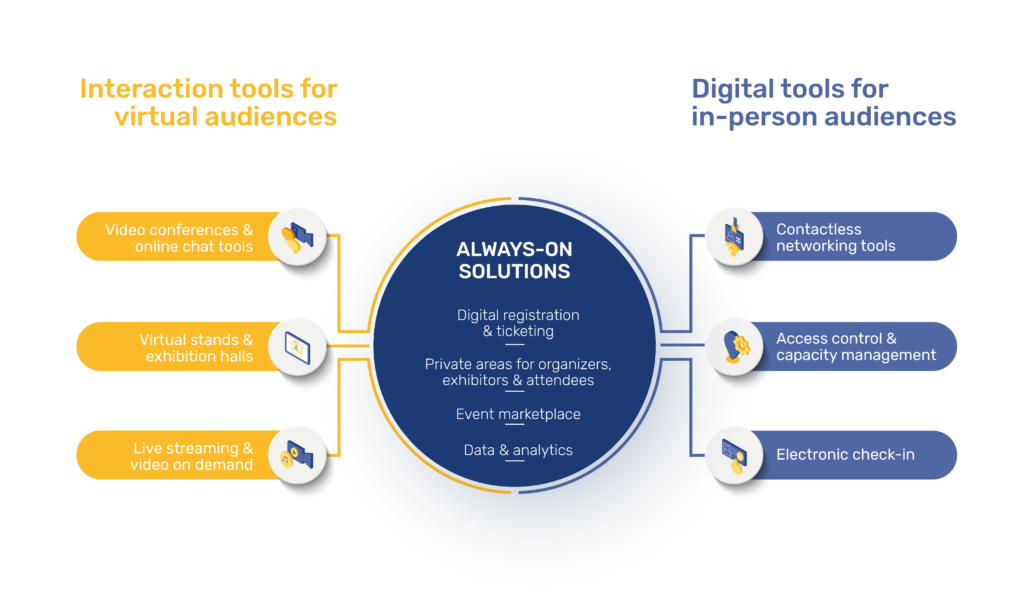There are many options to consider and questions to ask when it’s time to contract the services provided by the various events technology providers. The following topics will make it easier for you to decide between the available event management software alternatives.
Future events will be shaped by technology and deliver exceptional experiences
Technology is the key to organize successful events, helping to serve a useful purpose and achieve desired event outcomes. What used to rely on paper-based processes has evolved as our reliance on technology has grown too. Event management systems are here to increase efficiency, provide increased data and analytics, cut down on manual processes, and help prove event ROI.
Also, event technology plays an active role in keeping attendees engaged and delighted through exceptional event experiences. Alongside that, the event industry is following the natural evolution of video abilities, making use of virtual reality (VR) and augmented reality (AR) technologies to reach an immersive and interactive connectivity. Put simply, this means that real-world objects will be highlighted with added visual, auditory, haptic, somatosensory or even olfactory components.
Also read: How to choose the best video tools for virtual events
Contactless technology is another on-trend right now, simplifying connections with smart badges or smart wristbands that attendees can easily swap for contact sharing and lead capturing purposes. The best part? NFC tags can be embedded in a variety of objects, such as business cards, lanyards, labels, and keychains, making them an easy and scalable option (and don’t to worry, because tags can be deactivated in a matter of seconds in case of loss or misplacement). Learn more about how to individually identify event participants through smart badges or QR codes.
Often the decision for the right event management platform is intrinsically linked to technological requirements and specific market needs. This means that you’ll need to match the experience your event is intended to provide, as well as the actions it’s intended to trigger, with the features that will make it possible.
Hybrid and virtual events are here to stay
What pushed the switch to virtual events in the early days of the pandemic soon shifted to a hybrid event format, sharply accelerating the product development of many event platforms. Either to bring on virtual events not as small, one-off presentations or webinars, but as value-added, engagement-driven experiences, or to effectively connect remote guests with in-person audiences.
Some benefit from phygital events (with half-physical, half-digital features) to deliver one event with two experiences, others still opt for a stand-alone virtual event software as an opportunity that is enough to expand the geographic reach of their business marketing – it always depends on the event goals and circumstances. The truth is now that it’s no longer an imposition, we’re making virtual better with new technologies that make it possible for event planners to host online events in newer, more immersive, and far more engaging ways. As more people attended events remotely and provided their feedback, technology and creativity continued to shape content delivery for virtual & hybrid events.
One thing is certain – the power of human connection will continue to rely heavily on face-to-face interactions, but we cannot deny that going digital has triggered a strong change in event management, as all the benefits that remote communication has brought us are now more than proven. And they’re designed to last.
Why use an event management software?
If you’re looking for a one-word reply, automation is your answer. Of course, this involves knowing its extensions and applicability to the various key elements of event planning.
”According to Social Tables, event organizers who run their meetings and trade shows backed by an event management software increase attendance rates by 20%, efficiency by 27%, and gross margin by 20-30%.
Unlike most video conferencing services, event management platforms were meant to deliver tailored experiences and to offer specific benefits to a range of organizations, such as automating laborious and manual event tasks. Let’s now turn to some topics for a cross-cutting understanding of how an event platform can be life-changing for organizers in a variety of industry verticals:
-
Integrated management
The right event management software has to be a game changer for event organizers, allowing to track the complete flow of an event, where even the physical and virtual elements can be managed seamlessly.
-
Time saving
From registration and check-in to lead collection and reporting, a worthwhile event management platform enables both organizers and exhibitors to automate most processes for quick and seamless execution. For instance, administrative tasks of event organization like sending out invitations, manually admitting last minute attendees and payments, dealing with cancellations and refunds, and managing access to specific event sessions can be easily handled.
-
Revenue tracking
You should be able to track your impact as an organizer by helping your exhibitors analyze their business outcomes through an effective lead capture tool. The right event platform should give you clear and user-friendly dashboards and reports that allows you to visualize your performance and ensure you achieve a maximized event ROI.
-
Better engagement
Event engagement tools are essential to keep each audience’s experience top of mind. It’s through interactions that organizers and exhibitors, as well as attendees, can figure out the overall event experience.
Make sure your event management software facilitates the engagement of a distributed audience across different channels by accessing all engagement data in one place – whether it comes from live chat and video conferencing tools, or from recorded, contactless interactions at live events.
-
Simplified event data
Use statistics to generate event reports so that you can analyze what went well and where you could improve next time. Remember – if you know the performance of your exhibitors, you’ll know yours.
Try to make use of big data to read people. Why are attendees leaving early? Why are they showing up later to specific sessions? Why are exhibitor X collecting more leads than exhibitor Y? Are people getting what they need? Looking to exhibitors for clues on their performance is one of the best tips to improve attendee experience and engagement and to offer a more delightful event experience.
What to look for in an event technology provider?
The motto should be – ask first, choose next. Let’s suppose you’re planning an in-person event and need a venue to hold it. What do you do first? Do you choose the venue and then consider the event needs? No, of course, you don’t.
When choosing a technology partner for an event it’s pretty much the same. You should get a demo of the platform first and for instance ask the different vendors about their capabilities to develop customized features. If you aim to create impactful hybrid events, it’s probably best to ensure your event technology provider offers both digital tools to engage virtual attendees and on-site hardware to track all event interactions seamlessly. Also, it’s critical to define clear roles and align expectations regarding virtual event production and event live streaming.
Also read: Why live streaming quality is a main concern to event planners
Successful hybrid events aren’t made only by the choice of the event technology platform, but also by who’s behind its conception. Make sure you opt for one that has a customer success team with good support reviews and you’ll be halfway there.
Main features of an event management platform

beamian’s event management tools.
If you haven’t read our article revealing the 10 must-have event management software features, here’s a shortlist of characteristics every event platform should have. Featuring insightful usages and topics, use this event management checklist to guide your investment in the right direction:
-
Event Marketing and Registration
Drive a high registrant-to-attendee conversion rate with event marketing promotional tools.
-
Ticketing and Payments
Your event management software should allow you to sell event tickets and process payments easily and quickly.
-
Check-In and Occupancy Control
Does your event have crowd management safety guidelines to meet? Read this quick guide for event check-in & occupancy control.
-
White Label Branding
Don’t let participants tell that you’re using a third-party software to deliver your event.
-
Digital Lead Capture and Contact Sharing
Boost contact sharing and transform live event interactions into pipeline and revenue by making use of contactless solutions for events.
-
Sponsorship Exposure
Will virtual stand out? Make sure you have different options to highlight sponsors and showcase exhibiting brands.
-
Live Streaming and Conferencing Tools
Live stream your event to increase accessibility and enhance virtual networking with a chat tool or pre-scheduled individual or group video calls.
-
Engagement and Networking Tools
Connecting to other people is one of the leading motivations to attend events. Does the event platform you have in mind exchange contact information engagingly and record interactions, extending relationships post-event?
-
Real-Time App Notifications
Use an event app to keep attendees updated through push notifications. Easily announce changes in the event agenda, notify about upcoming sessions or send reminders.
-
Reports & Event Analytics
It’s 2022! You’re not allowed to not capture your event results. The right event management platform will show you important statistics and cross information with different sources of data, from online and in-person environments simultaneously.
Choose the best event management software for you
After all, and this being the conclusion we wanted to end with, narrowing down your selection to the right event management software doesn’t have to be a headache if you know what it takes to optimize logistics, management and business performance, meeting all your event needs. But let’s enrich this assumption with some final tips.
When making your final decision, look for resources that can add credibility to your buyer intention like case studies, product reviews or a quick demo that lets you determine if the features are as user-friendly as they are cool. Oh, and don’t forget to make sure you’re presented with sources that hold reviewers accountable, like Capterra.
Another hint is to look for defined pricing structures or prices that are easy to obtain on quote request pages that ask for some data about the event right away. This shows that each quotation is made and will be delivered according to the specifics of each event.








